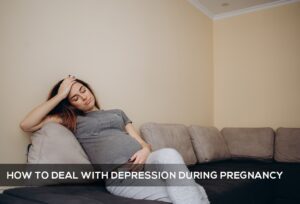Pregnancy is a period during which the female body experiences a turmoil of hormonal changes. This may cause many emotional rollercoaster rides.
If you are pregnant or are within a year of delivery and feel like going downhill emotionally, in other words, unhappy, and you can’t find a way to crawl out of it, then you might be suffering from perinatal depression.
What is perinatal depression?
Clinically the signs and symptoms match with the common Depression in adults, but it is sort of triggered due to pregnancy. There are two kinds of perinatal depression- prenatal depression (during pregnancy) and postpartum depression (within one year after pregnancy).
Perinatal depression is as common as one in every seven pregnant women across the world. Mostly it goes unnoticed due to the reluctance of the patients to speak about it to their family, friends, or doctor. It is mainly due to the word ‘depression’ being stigmatized.
One needs to understand that this condition is nobody’s fault, it is only as natural as getting any other medical condition. No one is responsible for it. There might be underlying reasons such as genetic disposition, hormonal changes affecting mood, or external factors like stressful lifestyle.
How to deal with perinatal depression?
The first step to fighting this sort of depression is to talk about it to your family and friends openly. They may get you a professional who can provide the right kind of help. Before they can treat you, you must speak to them about your feelings clearly and honestly.
The doctor will most likely give you a standard questionnaire and you will be scored based on your responses.
Questions related to changes in your feelings, changes in your everyday life, and changes in your body will be asked by the doctor.
You can respond to questions related to the changes in feelings by talking about your feeling sad, hopeless, overwhelmed, feeling restless or moody, crying a lot, feeling worthless or guilty, or thinking about death or suicide.
When it comes to changes in everyday life, the doctor is looking for answers related to your eating habits, trouble remembering things, sleep patterns, withdrawing tendencies from friends and family, losing interest in your hobby or passion, or things you liked to do.
Questions related to changes in your body are like if you are experiencing pain, such as headache, stomach ache, etc, and don’t go away, or feeling drained all the time.
What are the treatment options?
Once diagnosed, the doctor can determine the correct course of action for your betterment. There are different ways it can be dealt with.
First the parental care provider (doctor giving medical care during pregnancy), primary care provider (your general medical care doctor), and mental health care provider (psychiatrist, psychologist, social worker, counselor, or therapist), and if already delivered the baby, then the baby’s health care provider (pediatrician) should together decide on a combination of treatments depending on the requirements of the case.
The treatment options available are as follows:
- Counseling like cognitive behavioral therapy (CBT) or Interpersonal Therapy (IPT)
- Support groups can be found with the help of the concerned healthcare providers.
- Medicines like Serotonin reuptake inhibitors (SSRIs), Serotonin and epinephrine reuptake inhibitors (SNRIs), Tricyclic antidepressants (TCAs), and Buproprion.
- Electroconvulsive therapy (ECT)– electric current is passed through the brain to treat severe depression. It is considered safe during pregnancy.
How safe are the medicines?
The category of medicines that are called antidepressants is normally used to treat depression. But during pregnancy, it may lead to some problems like birth defects, premature birth, and even miscarriage. So it has to be carefully planned by your doctor. You should not stop or start an antidepressant on your own. If you stop it then your condition may relapse and get worse than before.
That exactly is the reason why ‘the combination of treatments’ kind of approach is used to battle depression.
Can all this be prevented?
In many cases just because the concerned person had decided to talk about their problems has been able to bring the whole situation under control.
If you have any of the following risk factors then you should immediately inform your doctor even before planning to get pregnant.:
- If you have, or had depression in the past
- Being a single mom, or pregnant as a teenager,
- Any family history
- Stress full life or job-related stress,
- Victim of intimate partner violence (IPV).
Pregnancy makes women vulnerable to all kinds of mental and physical battles. They are in a very delicate state and the people around them should provide adequate support, but ultimately it is them who should take care of themselves for their and their baby’s health and wellbeing.
With all this in place, your symptoms can be managed well. Trust your doctor and leave your health in their safe hands.





